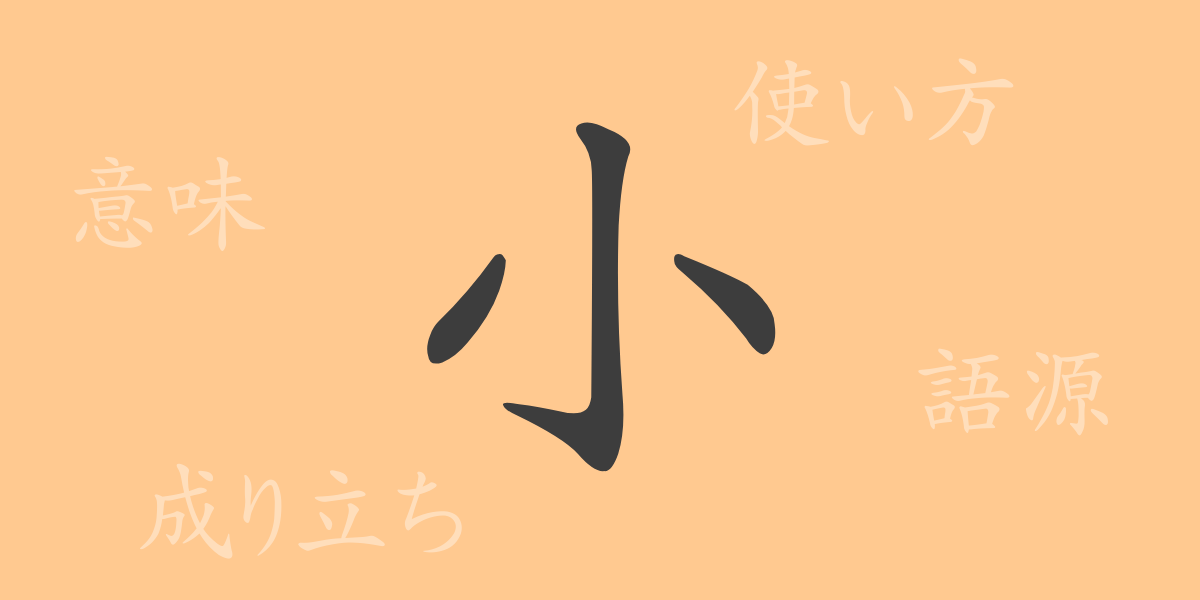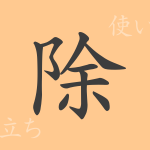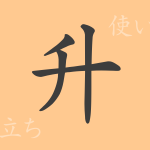Japanese Kanji, which are frequently used in everyday life, form the foundation of many expressions in the language. These characters are deeply ingrained in Japanese culture and education, from their meanings to how they are read and written. ‘小’ (こ, しょう, お) is one such Kanji, widely utilized in everyday conversation, literature, and business communications. This article focuses on the Kanji ‘小’, exploring its origins, meanings, usages, and related phrases and idioms, delving deep into its charms and applications.
Origins of 小 (こ, しょう, お)
The Kanji ‘小’ originated from ancient China as a pictographic character. Initially depicting ‘少ない’ (a little) or ‘小さい’ (small) through the arrangement of short and long lines, it has evolved into its current simpler form. The character symbolizes the basic concept of comparison between big and small, widely used not only in Japanese but also in Chinese and other Kanji-using cultures.
Meanings and Usages of 小 (こ, しょう, お)
‘小’ primarily denotes ‘small,’ ‘few,’ or ‘lower in rank.’ It is used as a fundamental adjective to indicate size, quantity, or juniority. It can also depict youthfulness or express something endearingly as small. In business contexts, terms like ‘小型化’ (miniaturization) or ‘小規模’ (small scale) frequently employ ‘小’ to describe product sizes or business scales.
Readings, Stroke Count, and Radical of 小 (こ, しょう, お)
Despite its simple structure, the Kanji ‘小’ offers a richness of readings and cultural depth.
- Readings: On’yomi (Sino-Japanese reading) is ‘ショウ’, and Kun’yomi (native Japanese readings) are ‘ちいさい’, ‘こ’, and ‘お’.
- Stroke Count: ‘小’ consists of 3 strokes.
- Radical: The radical of this Kanji is ‘小部 (しょうぶ)’.
Phrases, Idioms, and Proverbs Using 小 (こ, しょう, お) and Their Meanings
Phrases, idioms, and proverbs using ‘小’ are abundant in Japanese, reflecting the richness of the language and the depth of meaning held by a single Kanji. For example:
- 小春日和 (こはるびより) – Refers to a warm and calm late autumn to early winter day.
- 小耳に挟む (こみみにはさむ) – To overhear a bit of gossip.
- 小心者 (こごろもの) – Describes someone who is timid or faint-hearted.
- 小大器晩成 (しょうたいきばんせい) – A play on the phrase ‘大器晩成’, meaning great talents mature slowly; here, it suggests that smaller talents may show early but do not develop much further.
Conclusion on 小 (こ, しょう, お)
The Kanji ‘小’, despite its small form, significantly broadens the expressiveness of the Japanese language. Through this article, we hope you have gained a deeper understanding of ‘小’, its meanings, usages, and cultural significance. Proper knowledge of common Kanji like ‘小’ is essential for accurate language use and understanding, enriching your appreciation of the beauty of Japanese.

























